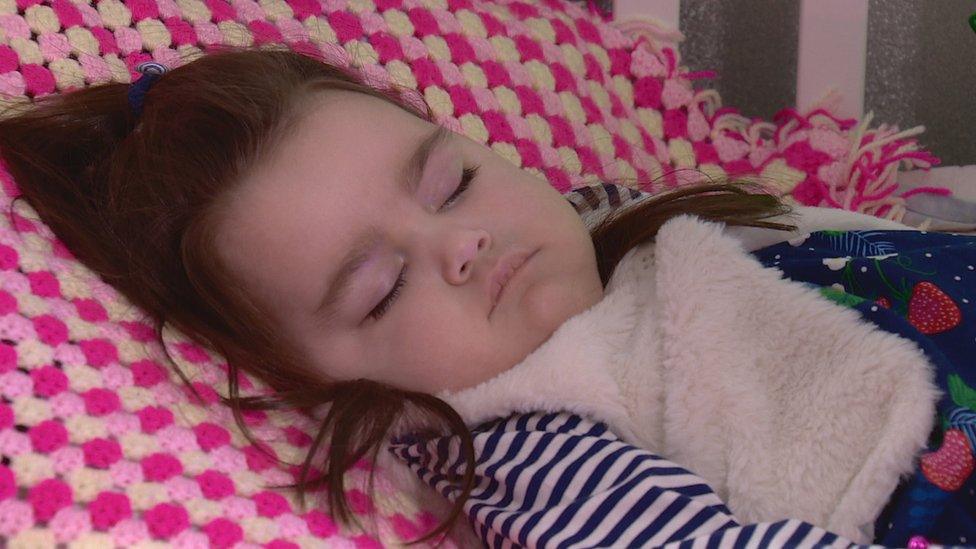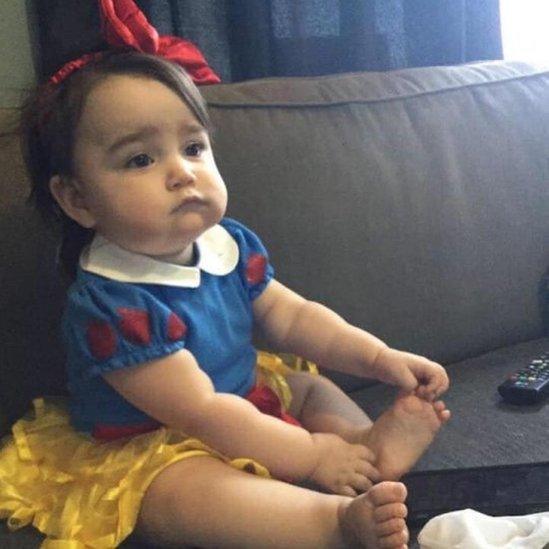'My daughter has childhood dementia and it's the worst diagnosis you can get'
- Published
Vicky Cunningham: "In my head, I am going, does she remember who I am? But she definitely knows mummy's voice - definitely."
The mother of a two-year-old girl with a childhood form of dementia has spoken of the challenges of dealing with the devastating disease.
Mirryn Cunningham has a chromosome disorder called Batten disease which has left her unable to eat by herself, walk or see properly.
It occurs in five or six births every year in the UK and there is no cure.
Her mother Vicky, from Uphall, West Lothian, said: "We've been given the worst diagnosis you can have."
Mirryn was born at 31 weeks and weighed just over 3lbs.
In January 2017 she was diagnosed with delayed myelination, a problem with the nervous system.
But further MRI tests revealed the full extent of her condition and she has now lost all motor skills.
'Never tried to hold her bottle'
Her mother Vicky told BBC Scotland's John Beattie programme: "It came to about the six months stage when babies should be holding bottles; when they should be reaching out trying to touch things; when their motor skills start to develop.
"Mirryn never tried to hold her bottle and could only hold gaze for maybe a couple of minutes then move away. As she got older and should have been doing more things, she wasn't rolling over or trying to touch a ball or any toy in front of her.
"There was a lot of to-ing and fro-ing because she was premature - people saying it will come, it's just delayed. My gut was going, 'no it's not'. She's now starting to lose more functions - even the little ones that she had are now all gone, including swallowing."

Mirryn's family are determined to make their time together as happy as possible
The condition Mirryn has is a rare disorder of the nervous system which typically begins in childhood.
According to the National Institute of Neurological Disorders and Stroke (NINDS), the first signs of Batten disease are impaired muscle co-ordination and seizures.
Vicky said she faced a battle to get a conclusive diagnosis after first speaking to her health visitor.
She said: "Mirryn was just over 3lbs when she was born at 31 weeks. She was in hospital for quite a while but just with jaundice, nothing else. Everything came back fine from brain scans and all the tests they run on premature babies.
"I tried to talk to my health visitor who referred me to St John's hospital in Livingston and it was a bit of a struggle to try and get them to pay attention to me.
"But we eventually got a really amazing doctor called Dr Valentine and he instantly referred us for EEGs and MRI tests."
That was in December 2016 and Mirryn was initially diagnosed with delayed myelination, which means signals don't get through to the brain properly.

Mirryn Cunningham was about six months old when she started to lose motor functions
Following continued pleas from Vicky, Mirryn had two more MRI scans and was eventually diagnosed with the CLN1 strain of Batten's in January this year.
A full support network has now been put in place for Mirryn and her family are determined to make the rest of her life as memorable as possible.
Vicky said: "She's got a palliative care team and community nurses, so the support aspect now that we've got the Batten's diagnosis is amazing.
"The support from the public as well is totally heart-warming and the messages that Mirryn gets sent show us that we need to stand up and say, Batten's is real, dementia in children is real - it's very rare but it happens.
"I think the reason that it took so long to get her diagnosis is because, even now, doctors that see her in the Sick Kid's Hospital or in Glasgow have no idea what Batten's is.
"Now, it's just about us making memories. There's nothing we can do to slow it down - there's nothing we can do to cure it.
"We had wanted to take her to Disneyland Paris but unfortunately due to Mirryn's condition I just didn't want to take the risk of being in the air if anything happened.
"So we've decided to bring Disney to our home town. It's taken a lot of work but we've got every single Disney character coming in fancy dress, we'll have a Disney show, Disney games, a bouncy castle. We're going to bring Disney to Mirryn."